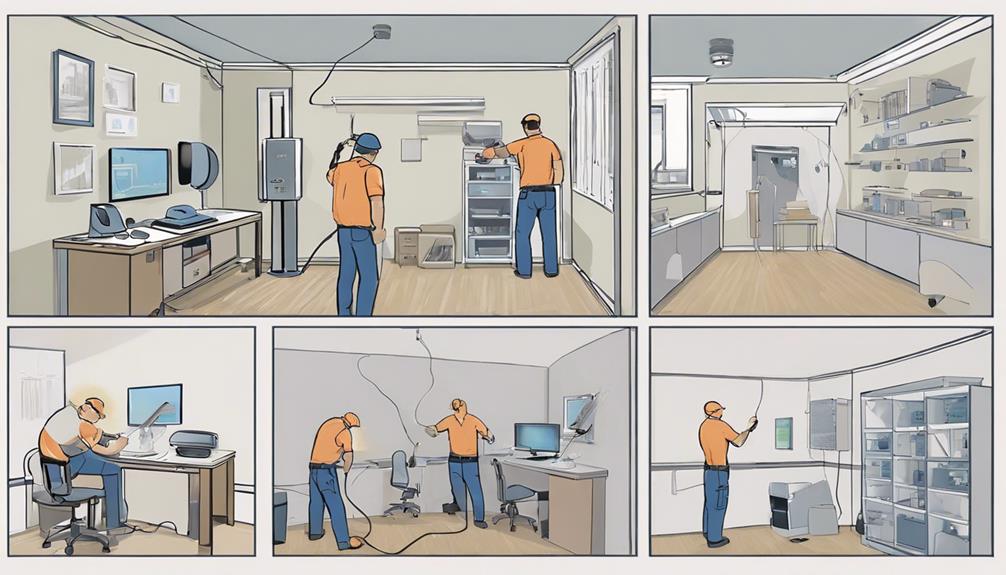When deciding between wireless and wired security systems, installation challenges vary. Wired systems offer stable connections and don't rely on batteries, ensuring consistent performance. Wireless systems face signal interference, especially with distance and internet dependence. For network security, wired systems resist hacking due to physical connections. Wired setups generally have higher initial costs but are more reliable long-term. Wireless systems provide easy DIY installation but require regular battery checks. If you want to explore further differences like cost considerations, user assurance, and various security features, understanding these installation challenges is essential for making the right choice.
Key Takeaways
- Wired systems offer reliable connections, while wireless systems face signal interference and connectivity issues.
- Wired systems resist remote tampering, while wireless systems are vulnerable to cyber threats.
- Wired systems have lower long-term costs, while wireless systems incur ongoing cloud storage expenses.
- Wired systems may require professional installation, while wireless systems offer DIY setups.
- Wired systems provide enhanced security features, while wireless systems may compromise security due to dependencies.
Connection Stability
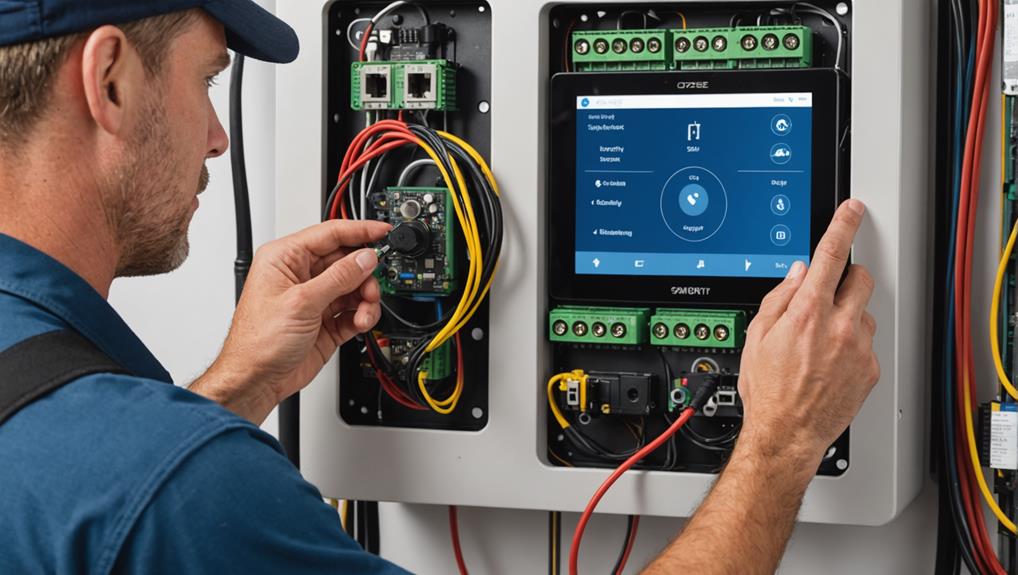
When it comes to connection stability, wired security systems outshine their wireless counterparts in reliability and consistency.
Security system installation can pose challenges, especially when considering the differences between wired and wireless setups. Wired installations may require more effort due to the need to run cables through walls or ceilings, but once in place, they offer a steadfast connection that's less susceptible to disruptions.
On the other hand, wireless installation challenges can arise from signal interference caused by common household devices, potentially leading to connectivity issues. Additionally, wireless security systems can be affected by the distance between the sensors and the control panel, further complicating their stability.
This can impact the effectiveness of wireless systems, particularly during periods of high interference. For vital security applications where a dependable connection is essential, opting for wired security systems is often the preferred choice.
The stability provided by wired connections guarantees uninterrupted monitoring and alert capabilities, making them a reliable option for maintaining security effectiveness.
Network Security
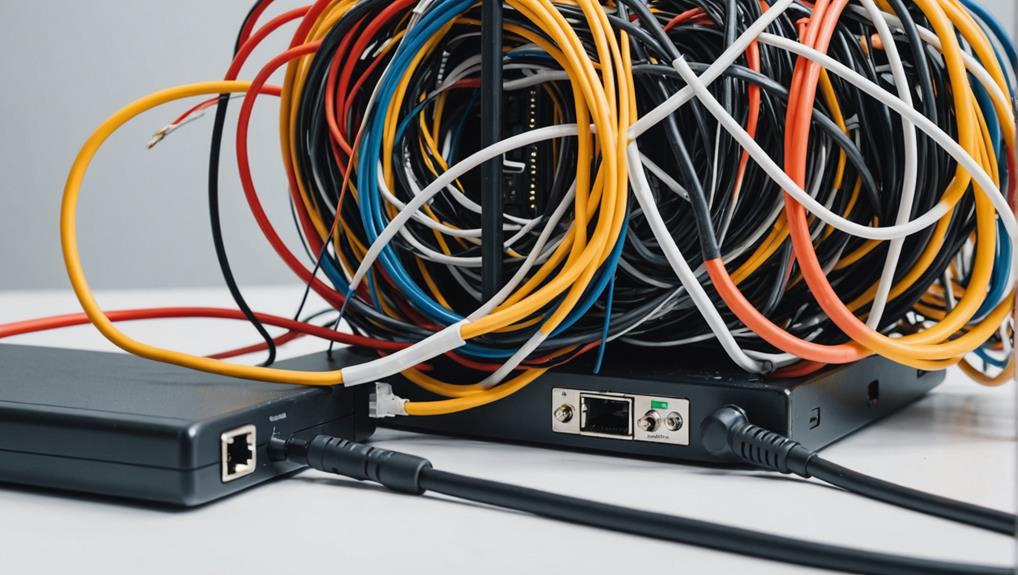
Moving from the domain of connection stability to network security, the focus shifts towards safeguarding your security system from potential breaches and unauthorized access.
When it comes to home security setup issues, installing wireless vs. wired systems can greatly impact your network security. According to an analysis of wired versus wireless residential alarm systems, it's crucial to evaluate their respective security advantages.
Here are some security system installation tips to reflect on:
- Physical Security Advantage: Wired systems require physical access for tampering, enhancing their resistance to remote hacks compared to wireless systems that operate through radio frequencies, prone to interception.
- Cyber Threat Vulnerability: Wireless systems, dependent on internet connectivity, may be more susceptible to cyber threats if not adequately secured with robust encryption and passwords, unlike wired systems that can function independently from external networks.
- Data Breach Protection: Wired systems with local storage decrease the risk of data breaches associated with wireless systems relying on cloud storage, offering a more secure solution for your network security needs.
Costly Cloud Storage Options

Opting for wireless security systems may entail pricey cloud storage subscriptions, introducing ongoing costs that can accumulate over time.
These expenses contrast with the local storage typically utilized by wired systems, offering a more cost-effective alternative without recurring fees.
For a thorough breakdown of costs, including monitoring fees, it's important to evaluate both the immediate and long-term financial implications.
As you weigh your options, reflect on how cloud storage expenses and data security concerns can impact the long-term affordability and reliability of your chosen security system.
Cloud Storage Expenses
Cloud storage expenses can greatly impact the overall cost of maintaining a wireless security system.
When considering the financial implications of cloud storage for your security setup, here are three key points to keep in mind:
- Monthly Subscriptions: Wireless systems often require costly monthly cloud storage subscriptions to store recorded footage. These recurring fees can add up over time, considerably increasing the long-term expenses of your security system.
- Financial Analysis: Long-term financial analysis leans towards wired systems due to the avoidance of ongoing expenses associated with cloud storage. Opting for a wired setup can lead to cost savings in the future by eliminating the need for continuous cloud storage payments.
- Data Reliability: Wired systems store footage locally, providing immediate access without reliance on external cloud services. This enhances data security and reliability, ensuring that your footage is readily accessible even during internet outages.
Data Security Concerns
Rarely do homeowners realize the potential data security concerns associated with costly cloud storage options in wireless security systems.
While wireless systems necessitate pricey monthly subscriptions for video footage storage in the cloud, wired systems offer a more cost-effective alternative by storing footage locally.
Relying on cloud storage in wireless setups can pose risks, such as data loss during internet outages, potentially compromising the security of recorded footage.
In contrast, wired systems provide immediate access to footage without external dependencies, ensuring homeowners can swiftly retrieve data when needed.
The absence of cloud fees in wired systems not only results in long-term savings but also eliminates the high costs linked to continuous cloud storage access.
Dependence on Internet Connectivity

Relying heavily on a stable internet connection, wireless security systems face a critical vulnerability when connectivity is lost. This dependence can lead to interruptions in essential functions like recording and alerts, potentially compromising your security.
Wireless systems are often praised for their ease of installation, but this convenience comes at the cost of reliability during internet outages. According to a comparative analysis of wireless and wired security systems, this is one of the significant drawbacks of choosing a wireless setup over a wired one.
Here are three key points to evaluate:
- Continuous Monitoring: With a wired system, you can ascertain uninterrupted monitoring even if your internet connection falters. This guarantees that your security measures are always active and reliable.
- Data Integrity: Wireless systems relying on cloud storage may face data loss if the internet connection is disrupted. Wired systems offer a local storage option, safeguarding your footage without dependence on external factors.
- Consistent Performance: Wired connections provide high-resolution video transmission without compression issues that wireless systems may experience with limited bandwidth. This consistent performance enhances security effectiveness, offering peace of mind in any situation.
Ease of Installation
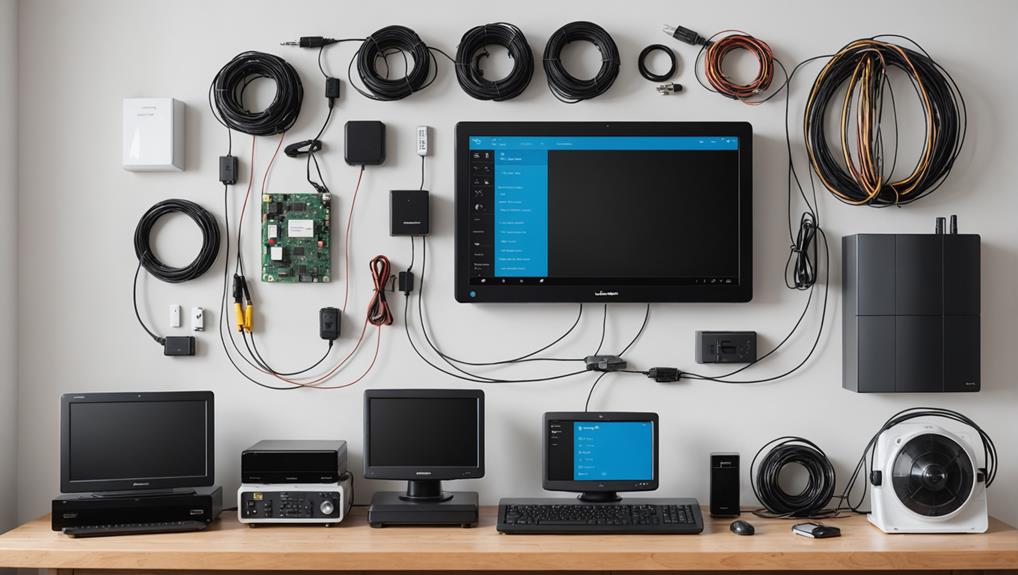
Given the simplicity of installation for wireless security systems due to their minimal wiring requirements, shifting to discussing the ease of installation offers a practical examination of the differences between wireless and wired setups. Wireless systems allow for quick DIY installation, making them perfect for renters and tech-savvy individuals. On the other hand, wired systems often require professional assistance due to the intricate wiring process, leading to higher costs and potential property damage. To illustrate the disparities further, consider the following comparison table:
| Installation Aspect | Wireless Security Systems | Wired Security Systems |
|---|---|---|
| Wiring Requirements | Minimal, almost none | Extensive, professional installation likely |
| Relocation Flexibility | Easily movable | Fixed in place |
| Installation Time | Quick and tool-free | Time-consuming and labor-intensive |
| Maintenance Needs | Regular battery checks | Less maintenance over time |
Understanding these installation differences can help you make an informed decision between wireless and wired security systems based on your needs and preferences.
Pros of Wired Home Alarm System Installation
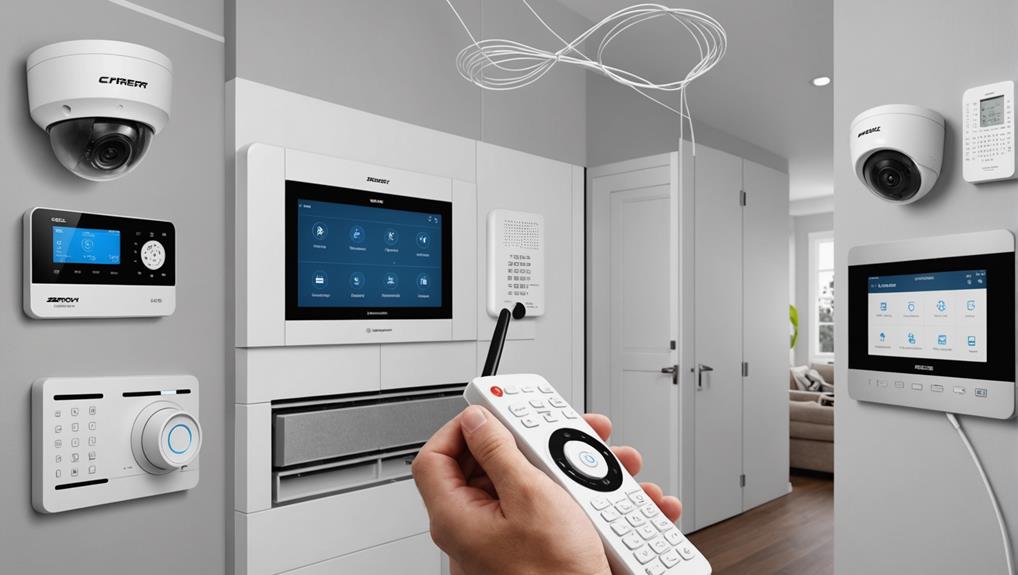
When considering installing a wired home alarm system, you can benefit from its reliable connection, providing consistent security monitoring without signal interference.
Wired systems are known for their stability, as they're less likely to experience disruptions compared to wireless systems.
With a dedicated power source, maintenance costs are minimized, making it a cost-effective choice in the long run.
Additionally, the enhanced security features of wired systems offer a more secure option that's less vulnerable to hacking attempts.
Installation Reliability Advantages
Opting for a wired home alarm system installation offers a range of reliability advantages that can enhance your overall security setup. Here are three key benefits to evaluate:
- Consistent Performance: Wired systems provide a reliable connection that's less susceptible to signal interference, ensuring your security monitoring operates smoothly without disruptions.
- Uninterrupted Operation: With a dedicated power source, wired systems eliminate the need for frequent battery maintenance, allowing for continuous protection without the risk of power failures.
- Enhanced Security: The physical connections of wired systems make them more secure, as they're harder to hack compared to wireless systems that rely on signal transmission.
This added layer of security gives you peace of mind knowing your system is less vulnerable to external threats.
Wired System Cost Considerations
Installing a wired home alarm system comes with notable cost considerations that can impact your overall security investment. The initial installation costs for wired systems are typically higher, ranging from $100 to $300 due to professional setup and labor-intensive wiring processes.
Additionally, cutting into walls and ceilings to conceal wires may incur extra expenses for patching and painting. However, despite the higher upfront costs, wired systems offer long-term savings by eliminating the need for battery replacements and frequent maintenance.
Furthermore, the reliability and stability of wired connections reduce the risk of costly false alarms caused by signal interference, common in wireless systems. The durability of wired systems also contributes to their longer lifespan, making them a cost-effective choice in the long run.
While the installation expenses may be higher initially, the reliability and longevity of wired systems make them a wise investment for your home security needs.
Overview of Intruder Alarm Systems
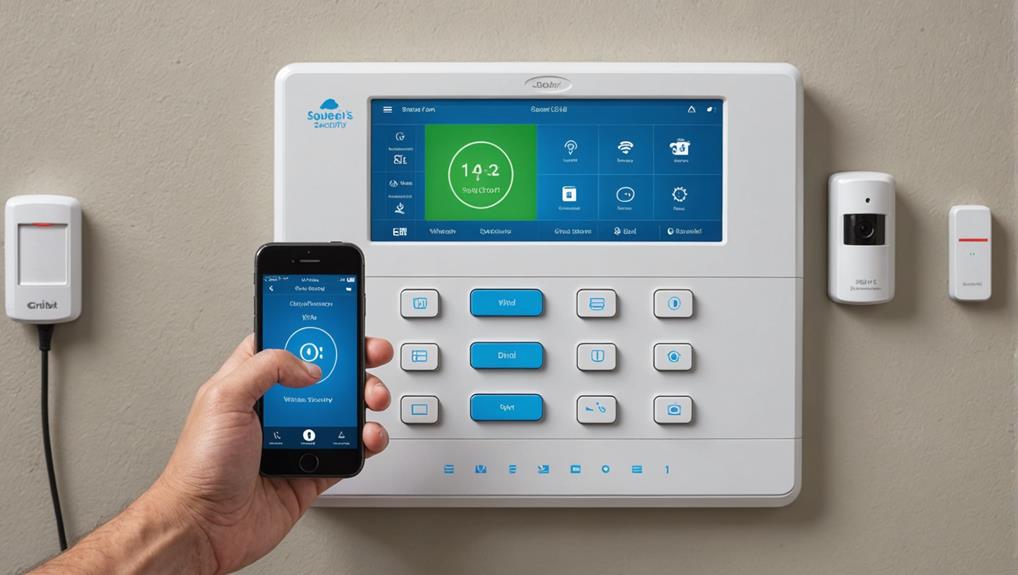
As you explore the domain of intruder alarm systems, it becomes evident that these security solutions play an essential role in safeguarding both residential and commercial properties.
Intruder alarm systems are vital for detecting unauthorized entry and enhancing security measures. Here's a quick overview to help you understand these systems better:
Intruder Alarm Systems Overview
1. Types: Intruder alarm systems come in two main types – wireless systems that rely on battery power and radio signals, and wired systems that use physical connections for stability.
Additionally, exploring various residential security systems can provide more insights into how these types differ in application.
2. Market Growth: The global market for intruder alarm systems has been steadily growing due to the increasing demand for heightened security measures in both residential and commercial settings.
3. Technological Advancements: With advancements in technology, such as improved sensors and connectivity options, both wireless and wired intruder alarm systems have evolved to offer enhanced functionality and reliability.
Frequently Asked Questions
Is It Better to Have a Wired or Wireless Security System?
For your security system, consider your needs.
Wired systems offer stability and lower long-term costs, yet wireless systems provide easier installation and portability.
Evaluate your home and preferences to determine the best fit.
Remember, wired systems may require professional installation and can be less flexible, while wireless systems can face interference issues.
Ultimately, choose the system that aligns with your priorities for security and convenience.
What Are the Disadvantages of Wireless Security?
When it comes to wireless security systems, keep in mind some drawbacks.
Signal interference from household gadgets like microwaves can disrupt communication between sensors and the control panel. Regular maintenance and battery replacements are needed, adding to your to-do list.
There's also a risk of hacking due to reliance on internet connectivity. If the internet goes down, the system's performance suffers, affecting recording and monitoring capabilities.
Larger properties might struggle with coverage and sensor limitations.
Are Wired Alarm Systems Obsolete?
No, wired alarm systems aren't obsolete. They provide reliability and reduced interference compared to wireless systems.
They offer longevity and lower maintenance costs, unlike wireless systems with ongoing expenses. Professional installation guarantees security and stability, making wired systems less susceptible to hacking.
Hybrid systems combining wired and wireless elements are gaining popularity.
Your choice should be based on your specific security needs, property type, and preferences, not the obsolescence of wired systems.
Is It Better to Install Your Own Security System?
When considering installing your own security system, it's crucial to weigh the pros and cons.
DIY setups offer flexibility and cost savings, but they require ongoing maintenance.
If you value convenience and easy installation, a wireless system might suit you.
However, for a more robust and reliable solution with less upkeep in the long run, investing in a professionally installed wired system could be the better choice for your peace of mind.
Conclusion
In summary, when it comes to installation challenges, both wireless and wired security systems have their pros and cons. While wireless systems offer ease of installation and flexibility, they may suffer from connection stability issues and dependence on internet connectivity. On the other hand, wired systems provide a more secure network and do not rely on internet connectivity, but can be more costly to install. Ultimately, the choice between the two will depend on your specific needs and preferences.

